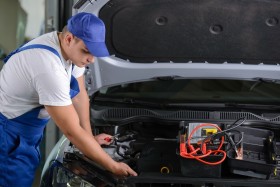What Happens If Your Car is Recalled

If you’ve been following the news lately, you’ve probably heard a lot about car recalls and defective car parts. In 2014 alone, General Motors has recalled over 29 million vehicles worldwide for a multitude of issues, the most publicized one being a faulty ignition switch that has been linked to 30 deaths. Recently, Takata has come under fire for defective air bags. With all the attention defective cars have been getting lately, it’s likely that you’ve wondered what happens if your car is recalled.
If your car is recalled, you should get a letter in the mail from the manufacturer with “Safety Recall Notice” printed on the front of the envelope. To send these notices out, the manufacturer compares their records of vehicle owners with the state’s car registration records. The recall notice should explain what the defect is, how it poses a safety hazard, how it can be fixed, when the repair will be available, and what the owner can do if they are unable to have it fixed in a timely manner.
The recall notice should also mention that the repair will be done free of charge. However, there is a limitation on how long a car can receive no-cost recall repairs. Cars are eligible for no-cost recall repairs for 8 years after the original sale date of the car. For cars that are 8 or more years past their original sale date, you may have to pay for the repairs yourself.
After receiving a recall notice, you should have the problem repaired at a local dealership (it doesn’t have to be the same dealership where you purchased the car) as soon as possible. If your recall is regarding an issue with tires, you are required to have the issue repaired within 60 days.
Although manufacturers are required do the best they can to contact car owners, you might not get a notice in the mail. To find out if there are any recalls on your car, the NHTSA website has a tool on their website that will tell you everything you need to know. If you hear about a recall but don’t get a recall notice in the mail, you can also contact the manufacturer or a local dealership, tell them your VIN number, and they will be able to find out whether or not your car is included in the recall.
If you aren’t a car’s original owner, you are still eligible to have the problem fixed for free in the event of a recall, even if the recall happened before you became the car’s owner. If you’ve recently purchased or are considering purchasing a used car, the NHTSA website has a VIN lookup tool that lets you see if a car has been recalled and whether or not that specific car has had the necessary repairs made. After buying a used car, it’s a good idea to contact the manufacturer and let them know you are the current owner so they can update their records accordingly and make sure you get any future recall notices and other important notifications.
In most cases, if you bring your car to the dealership with the letter of recall, they will fix it for free with no problems. But occasionally, dealerships try giving people a hard time about doing the repairs or try to charge for them. If this happens to you, talking to the dealer service manager is usually enough to solve the problem. If talking to the dealer service manager doesn’t work, a phone call the the manufacturer may get the job done. You should be able to find the manufacturer’s customer service phone number listed on the recall notice or in your car’s owner’s manual. If you’ve spoken to the manager and the manufacturer and are still unable to get the repair work done for free, contact the NHTSA at 1-888-327-4236.
Our personal injury attorneys at the Law Offices of Goodwin & Scieszka are experienced in other areas of injury law like slip and fall accident cases and medical malpractice claims. Contact us to see how ew can help you be fairly compensated.






